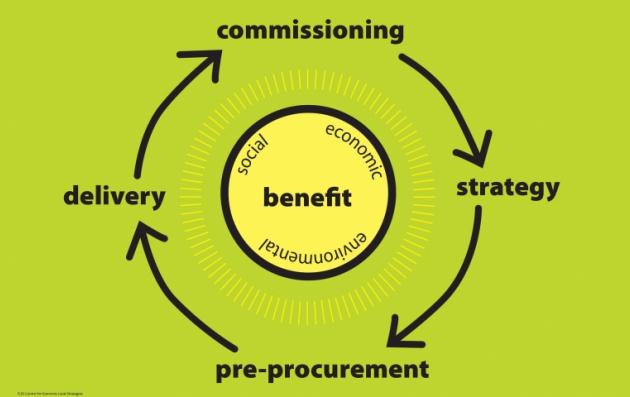Date of label : 02/06/2017
-
Preston , United Kingdom
-
Size of city : 143.135 inhabitants
Previously transferred

Summary
In 2013, Preston City Council (UK) and six other anchor institutions embarked on a project to identify how their wealth could be understood and harnessed more effectively for the benefit of the local economy. An element of wealth that anchors institutions can influence their procurement spend. Central to the work in Preston has been the analysis of these institutions’ procurement (1 billion euros), to understand where that spend goes geographically and on which types of business type, and what happens to it once it reaches suppliers. The anchor institutions then used the evidence gathered to inform how they undertake procurement. Some institutions have revisited the spend analysis: evidence suggests their spend has increased in the local economy and with small to medium-sized enterprises. The work demonstrates the importance of using evidence to shape policy change and the role of procurement in addressing challenges.
The solutions offered by the good practice
The good practice offered by the Preston City Council and the six other anchor institutions is a methodology and means of changing behaviour around procurement so that it generates more local economic, social, and environmental benefits. The methodology consists of three parts. First, it enables cities and institutions to understand where their procurement spend goes. So, the methodology measures the extent to which the annual 1 billion euros of procurement spend of the anchor institutions is with: businesses based in Preston and Lancashire, SMEs and social enterprises, and with businesses in particular industrial sectors. Second, it enables cities and institutions to understand the extent to which their procurement spend occurs elsewhere in the UK and across Europe and in which sector and to explore the scope for that money to be spent with different types of business, for example.. Third, it enables cities and institutions to identify the extent to which their suppliers are creating jobs or apprenticeships and find out about their practices around social sector engagement or environmental management. Effectively this activity develops an evidence base through which cities can understand the existing contribution their anchor institutions make to a local economy and assists in developing policies and practices through procurement which can enhance those contributions and further harness the potential or wealth of anchor institutions.
Building on the sustainable and integrated approach
The good practice fits with URBACT principles because it is about harnessing the wealth of anchor institutions through procurement spend which can help to create wealth in the local economy, thereby reducing poverty and social exclusion through increased employment opportunities, the creation of new businesses and supply chains, skills development, and dealing with environmental issues, for example, by reducing carbon footprint, waste etc. It is also based on an integrated and participatory approach whereby the anchor institutions (public and social sector) work together to ensure that their procurement spend is used to bring additional economic, social, and environmental benefits to their local economies. The recent inclusion of stakeholders from business networks ensures that the voice of the private sector, and also supply chains, are involved in the process. Whilst the good practice initially focused specifically on the Preston local authority area, it has now been broadened to encompass the wider functional urban area (of Preston and South Ribble) and also the wider Lancashire region, ensuring that the horizontal, vertical, and territorial integration aspects have been taken into account.
Based on a participatory approach
The work around anchor institutions and spending analysis in Preston commenced in 2013 and continues in 2017. Over the last four years a range of stakeholders has been involved and the whole project is framed by a cooperative desire across the institutions to use their wealth to create greater benefits for the local economy. Stakeholders have been involved throughout the work.
- The chief executives and political leaders (where appropriate) were visited to secure their buy-in to the principles of harnessing the wealth of institutions.
- Procurement officers in each of the institutions were engaged to share data around their procurement spend and their suppliers to enable the analysis to take place.
- The chief executives, politicians and procurement officers were brought together to share the findings of the supply chain analysis and to develop a collective statement of intent as to how they were going to change practices around procurement in light of the analysis.
- The procurement officers have continued to meet through a procurement practitioners group and now an URBACT local group (as part of the Procurement Network) to discuss how they are changing practice around procurement.
- The supply chain of some of the anchors has been engaged to identify the wider impact they are bringing through the delivery of goods and services. Engagement has been sustained over the course of the last four years with the stakeholders described above.
What difference has it made?
The overall achievements of Preston have been:
- It has positioned Preston as a progressive place for local economic development and addressing poverty.
- It has led to a much more effective relationship within and between institutions in Preston.
- It has enabled a range of baseline data to be collected about the existing impact of anchor institutions and the wider business base in Preston.
- It has secured the buy-in of senior stakeholders and enabled the development of a collective statement of intent.
- Through the analysis of where spend goes and in what sector, it has enabled a much greater understanding of Preston’s business base and those which could potentially deliver goods and services.
- It has changed behaviour around procurement in each of the institutions and enabled enhanced impact. For example, the proportion of spending of Preston City Council with Preston-based businesses through procurement has increased from 14% to 28%.
- It has recognised that this is a long-term approach to addressing key challenges.
- It recognises the importance of scale when implementing wealth-building initiatives.
- It has had an impact on addressing wider issues including low pay and deprivation. The core impact has been in the behaviour of anchor institutions and the realisation that spending analysis and procurement can be utilised as a lever or way in which challenges facing cities can be addressed.
- The approach has enabled more effective engagement with SMEs and subsequently a greater proportion of SMEs being successful.
- There is a more collective approach to not only delivering local economic benefits through procurement but also to Social Value.
Transferring the practice
Over 2.5 years, Preston has led the Making Spend Matter network, transferring its practice to 6 other cities: Pamplona (Spain), Kavala (Greece), Bistriţa (Romania), Koszalin (Poland), Vila Nova de Famalicão (Portugal), Schaerbeek (Belgium). You can, in particular, check Koszalin’s Good practice here. The approach was based on Preston’s four areas of work adaptable to each city’s reality: Advanced Spend Analysis, Business Database Development, SME Capacity Building, and Social and Environmental Criteria. The final outputs are all available on the URBACT website.
-
296_Preston_Gpsummary.pdf(PDF, 199Ko)

